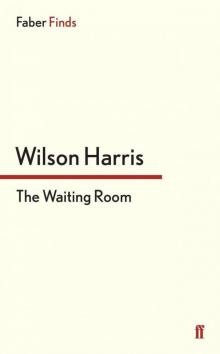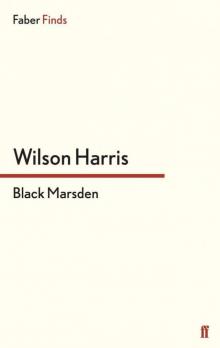- Home
- Wilson Harris
Black Marsden Page 10
Black Marsden Read online
Page 10
“Well, well, imagine that. I never heard.”
“Ah well, it was all for the best. He was near eighty and failing.”
“Poor Willie.”
“Not so poor. He left a guid sum and a car and a shop.”
“Fancy that. He did well for himself then.”
“Aye,” says the woman. And they sigh in respectful unison.
A moment later the man asks softly: “Who did he leave it to then?”
I sense a change of weather in the woman’s voice: “Would you believe it—d’ye know that daft besom …?” I miss the rest of what she says as the bus draws up and we climb aboard. I am left with a vivid sketch of Willie; intrigued also by the curious melancholy practicality of the conversation and the puritan indictment of Willie’s “daft besom” whoever she may be.
Invisible Willie has stood before his judges in the queue and some portion of his anomalous estate has rubbed off on me so that his fortune becomes a pooled reflection to sum up the state of the world in which I live.
I get home still denuded, hang my coat in the hall and am about to make my way to my room when Jennifer pokes her head out of the kitchen: “Oh Clive, I’m glad you’re in—Mrs. Glenwearie’s away.” She laughs as she tries to mimic Mrs. Glenwearie’s voice.
“Away?” I cry.
“She asked me to apologize for going so abruptly but she said you would understand. There’s been a message about her niece. She didn’t say what it was.”
“Oh,” I am relieved. “Yes, her niece is an invalid of sorts.”
“In the meantime I promised to keep things shipshape.”
“That’s nice of you, Jennifer.”
“Clive!” Her manner changes, grows almost apprehensive. “Can I have a word with you?”
“Why of course.”
“Mardie’s out at the moment. In fact I don’t think he’ll be back for a couple of hours or so.”
“I’ll join you in the sitting-room in a few minutes.”
When I get there she has laid out scones, bread, butter, biscuits, cake, which I eat (I am suddenly ravenous) and enjoy. “I saw you in the Botanical Gardens today.”
She turns and looks at me now as if she sees me for the first time: “Why didn’t you say something, then?”
“Oh well, you seemed so absorbed in your companion. I did in fact try to call out to you later but you had already turned a corner. I found a comfortable seat overlooking a stream and wrote.”
“Is it an autobiographical work? Mardie knows about it.”
“Does he?” I ask darkly. “Very little one does is private nowadays. There’s always someone spying at every word. From bureaucratic camera or taxman or censor to the livid clock on the wall. But to return to your question. My book is not autobiographical. I lose myself in it, you see. In the same token I need to intuit when to pull back. The existences I probe are dark and sometimes the very spectre of oblivion confronts me. But what is the nature of oblivion? How close can one come to it, learn from it, without succumbing to it, without being swallowed up in it? Is there a warning that lies just beyond all given shapes of knowledge in order to distance (in some degree disarm) the traps or fascinations of ritual knowledge?”
“Clive,” Jennifer is pleading. “I’m sorry to interrupt. I wish I could spend all night listening to this. It is really fascinating. But I am in trouble. I need your help and I must speak of it before the others get back….”
“Jennifer! What is it?”
“Clive, I believe I am pregnant.”
“Pregnant?”
“I’m almost certain. I’ve missed one period and the doctor is pretty sure. He’ll know for certain when I see him in another week. But the thing is …”
I feel I have been dealt a blow. I am astonished, flabbergasted and blurt out the first thing that comes into my head: “You want to get married. You want money.”
“No, no. Not that.”
I blurt out again: “Jennifer, what do you mean—has he refused to marry you—is he the one in the Royal Mile or the one I saw you with in the Gardens today?”
“Clive, since I’ve been here you and I have quarrelled occasionally but we’ve been friends.” She lowers her head. “I think I can be honest with you.” She looks at me now a trifle defiantly. “I want to keep the baby but I don’t want to marry.”
I am silent.
“How can I help you?” I ask at last. “If it’s a question of money?”
Jennifer decides to take the bull by the horns. “It’s more than plain money. If I accepted a straight gift of money from you I could live with Ralph whom you saw me with today (poor Ralph hasn’t a penny to his name) until the baby is born. But who knows what claim he may make after upon me or upon the child? I couldn’t risk that sort of thing. I need a neutral establishment which I could leave whenever I wish. Clive,” I see her steeling herself, bracing herself, “could you let me stay here, let me pretend I’m your mistress or assistant housekeeper or something—anything? I don’t care. I know it sounds immoral and all that but you’re a rich man. And you believe in people. A rare combination, believe me. All I want is to have my baby in an atmosphere that is really secure. Perhaps I’m cheating. I want a kind of family prop, though in fact I don’t believe in family props any longer. I want to have a man beside me who can afford to give me all sorts of things without making any demands on me. I need someone like you, Clive. I’m not in love with anybody. I’m not in love with Ralph. I like you as much as any of the men I’ve known including Ralph. I want—I want my baby all for myself.”
“Have you told Marsden?” I blurt out.
“No. Not yet. He would be absolutely mad.”
“Mad? What do you mean by mad? Does it matter so much whether he’s mad or not?”
“Of course it does. I’ll tell him when I’m sure of everything. When I know what I’m going to do about it. Then perhaps when he understands, perhaps if you agree to what I ask of you, Clive, he’ll be less furious.”
“I need to think about this. Perhaps when you have seen the doctor again I’ll have come to a decision. In the meantime it’s our secret. I won’t say a word of it to Marsden.”
She comes close to me, my pregnant Salome. Her lips brush mine. For a moment at least I have more of her than Marsden and this pleases me.
*
In the late evening Goodrich made his way down to the wall near Newhaven Harbour and became absorbed in the flickering shadows on the water and the lights far across the water on the shore of Fife. In his mind he could still hear Jennifer’s voice like a pulse beating inside him, a smiling wry pulse almost, imbued with a brutal candour and yet a childlike ripeness.
His present reaction, perhaps irrational, to her proposal was a sense of the interrupted journey he had made across Namless with Knife. It was odd, he knew, to think of the pages he had written that afternoon as an actual journey but, in fact, related as they were to an earlier diary (which was related, in its turn, to actual but transformed family histories and movements and events) it all loomed now as stranger than fiction and therefore in that sense as life.
He recalled the piper’s warning threaded into the stars which in the wake of Jennifer’s proposal returned to him now with renewed potency. Knife had said that the music had ceased to counsel retreat and had turned into an invitation into the tunnel, the open-ended tunnel. But suddenly he was stricken by an illumination; by the fact that he had elected to pull back from the tunnel; and in abandoning the journey had obeyed the original counsel of the pipes. Had he gone forward—written another page in that direction (his heart was beating fast) would he be here now—would he have literally collapsed into coming face to face with the Nameless Other in a death for which he was unprepared? Yes, he was unprepared to die—his knowledge of death was not only incomplete but too biased. So biased it could prove a grossly shattering event. It was a strange climax to absorb within his private book—that another step forward would have proven one too many and Knife would have tricked
him and silenced him and his life would have been absorbed into a dead man’s silent pipes.
It was an irrational but immensely powerful conviction which welled up inside him and seemed to imbue Jennifer’s pregnancy with an enigmatic secret in contrast to his enigmatic return….
A lorry was rolling past behind him on the road to Granton. The cry of the gulls came over the water. There was a murmuring subtle crash and wave on the foreshore.
And he felt in his denuded state or shadow against the wall a new tide or re-creative decision at the heart of a crowded world. It was a strange realization, a chastening realization, in spite of apparent intoxication: chastening in that he saw himself now in line with both the pale rider in the Royal Mile and the out-of-doors mechanic who had been Jennifer’s companions over the past months. He now, as her third potential consort, saw himself equally riddled with the malaise of the twentieth century—with a bankruptcy of authority. And yet in clinging to the annunciation of decision which he made at the door of death, he was beginning to relate himself differently both to the dreadful vacuum of his age and to the implacable biases underlying that age—biased flesh-and-blood, biased creeds, biased refuge in wealth.
The air suddenly began to grow chill and he turned and made his way back up the hill with a feeling of absurd authenticity, authentic family man wrapped around in his scarecrow past, scarecrow fears of standing in a shivering bread line or queue at the door of death. Scarecrow fears which his intelligence imbibed, scarecrow fears which his marriage imbibed as the road to doom or the way of life.
He felt as he inserted his key into the lock of his front door that he stood face to face with a far-reaching dilemma—a far-reaching decision which in some curious way he had already made.
*
The next morning Marsden and Goodrich breakfasted together, Goodrich knowing he must disclose nothing about Jennifer, Marsden looking less sardonic than usual, his beard more disordered than usual, and Goodrich recalled the intelligence agent he had seen in Namless: another deeply planted association of assassinated book or dream and interrupted reality. And it gave him a sense of ascendancy over Marsden, a dangerous illusion of ascendancy perhaps. Yet how could he help but entertain it? For it was as if Marsden silently pleaded with him, as if he had been drained of some measure of diabolic self-assurance, depleted of an omniscient function.
It was this hiatus of knowledge—Marsden’s unpreparedness for a new life which matched Goodrich’s unpreparedness for Nameless Other—which saturated their relationship this morning like an omen of the future. Marsden’s complexion seemed a shade darker this morning, half-Oriental, half-Celtic. He dawdled over his coffee and toast. What was quite extraordinary, however, in all this procrastination was the expression of neutral age which adorned him. He could have been forty years old or twice that for all Goodrich knew. It was the Oriental detachment perhaps, an Oriental vacuum that seemed to bring him into line with Jennifer’s depleted consorts. At first it seemed a defeat for him of all persons, a reduction of his overwhelming stature and yet (Goodrich wondered) was it a ruse—the significance of which he could not yet judge?
“Would you pass the marmalade, my dear Goodrich?”
As he did so Goodrich felt his eyes upon him, pleading still but demanding also to know what he knew. And he fought him off easily now that they stood, as it were, on equal footing in a post-hypnotic threshold to life.
“You seem greatly preoccupied this morning, Goodrich.”
“I was thinking,” Goodrich said, toying with the idea of a personage of property as one would reflect upon a body of superstition, “of a new section I would like to add to my book—a journey through Demerara which I visited once many years ago and attended an East Indian wedding ceremony.”
Marsden pricked up his beard like antennae of perception. “Sounds interesting,” he said, biting into his toast and marmalade, “I have never seen an East Indian wedding ceremony. What is it like?”
“It’s a question—at a certain stage anyway—of getting the bridegroom to eat.”
“To eat?” Marsden dabbed his lips with a napkin and poured himself another cup of coffee.
“Yes, you see at a certain stage unless the bridegroom eats the marriage ceremony falls through.”
“What an embarrassment for all, I would think.”
“Indeed. Imagine the scene. The bridegroom sits regally in his chair. Turbaned, a living ornament. The bride’s father offers him a cow.”
Marsden laughed: “And waits for him to eat?”
“And waits for him to eat, yes. For if he eats a morsel it is a sign that he accepts the gift. But if he does not stir a finger his father-in-law-to-be offers him another cow. Then a piece of land perhaps. Then a horse or a bull….”
“And still,” said Marsden chuckling hoarsely, “he may refuse to eat?”
“Quite so. Then the father-in-law doubles his offer. And after consulting with his family may—if he can afford it—come up with a motor-car.”
“What about an expensive camera?” said Marsden and as he spoke Goodrich recalled the hypnotic persuasion cast upon him and Mrs. Glenwearie when Marsden first arrived: hypnotic walking camera, hypnotic flashing bulb.
“A camera,” he said (and he was glad this time he could resist him so easily, almost banteringly), “yes, why not? To take his bride’s picture and then later the pictures of his children.”
“Presumably in the end he does eat?” said Marsden.
“Yes, invariably I understand he eats, but not before—on rare occasions anyway I would imagine—the wedding party is enshrouded in fear.”
“Fear?” Marsden brooded.
“Fear, yes, by those who bring the gifts that they may have to twist his arm. Make him eat. And fear in him as a consequence—fear of their methods of persuasion.”
“You have aroused my curiosity, Goodrich, I must say. You speak of fear. I take your point. Why is it indeed that in every contract between men fear appears to be such a dominant principle? Last night I was reading Writings from the Philokalia translated by one Kadloubovsky and one Palmer. Prayer of the Heart I think it is called. And as you spoke of your remarkable bridegroom I could not help recalling this passage: ‘A man who has planted the fear of judgement in his heart seems in the eyes of the world like a prisoner in irons. For he is constantly afraid of being seized by a merciless executioner and dragged to the place of execution.’ In the same context the passage goes on to say that if that man can endure the constraint of his bonds to the bitter end ‘his bonds—his fear—will fall off, his executioner will hasten away and his heart’s grief will turn into joy which will become in him a fountain of life or a spring for ever gushing forth: physically—rivers of tears; spiritually—peace, meekness and unspeakable delight’.” Marsden was laughing deeply. “So you see, Goodrich, your bridegroom may be quite right in tightening those bonds and in enduring the gifts showered upon him to the bitter end.” For a moment or two it seemed Marsden had become his old ruling mocking self but it did not last long. The sense of depletion which Goodrich still associated with the assassinated agent in Namless returned and brought him back into line with Jennifer’s consorts. Was it a ruse, Goodrich wondered …?
*
Two days later Mrs. Glenwearie wrote to say that her sister had been taken very ill and she must therefore remain to look after her invalid niece and her brother-in-law. Would he mind if she arranged for a temporary woman to come into the Goodrich establishment, clean and cook?
The ground of duty Goodrich knew from past experience was a religious question with Mrs. Glenwearie. If her sister recovered she would return but if she did not or became bed-ridden she would have no alternative within her own lights but to relinquish her situation as his housekeeper.
Goodrich knew that if this happened he would miss her very much. A picture floated it seemed from nowhere into his mind as he put down her letter, of old chateaux in France and titular houses in Britain where at each turn of the road a sculptured
sentinel from the past stands watching the world of the present. And written into that vigil was the notion of duty or loyalty to laird or king or party.
It seemed incongruous that he should identify Mrs. Glenwearie’s good works with that vigil; the vigil of the nurse, the vigil of duty with estates of power; yet so it seemed to him now as he contemplated her by the sick-bed of her family. A curious melancholy consistency was there in a series of postures rooted in identity and frozen into a paragon of duty extending from château to cottage.
It was the irony of the situation that wrapped itself around him now. He stood on the eve of giving an answer to Jennifer, and Mrs. Glenwearie had been conveniently or inconveniently whisked away and frozen, as it were, into a picture of duty.
There was a logic here—an intuitive logic towards which one could grope on this level of fascination with corresponding events. The translation or transformation of Mrs. Glenwearie may have been implied the very moment, some months ago, she had conceived flash-bulbs in the sitting-room turned on in—or upon—naked Jennifer by Marsden—Marsden disguised as Camera: a walking camera like a deacon of the cinema fully clothed, fully dressed, who invaded Goodrich’s dreams until Knife slashed the cloth.
In Goodrich’s book every correspondence of events within an individual life was an implicit and secret dramatization of buried universal themes within objective existence. For what was objective existence in the long run but a series of common-or-garden situations? For that reason it was an easy trap to view Mrs. Glenwearie’s voyage to the sick-bed of her family as another common-or-garden inevitability divorced from bizarre conjunctions involving Deacon Camera, Jennifer, Knife etc.
But the very expression “inevitability” gave the game away and implied a pattern, a pattern of far-flung devious subconscious intelligences at work through the day-to-day normal situations of each individual in society. It was the exposure of that pattern which interested Goodrich. For without some degree of exposure, inevitability would become both an all-consuming ritual principle and a forgotten bias of fate in the affairs of men.

 The Waiting Room
The Waiting Room Black Marsden
Black Marsden The Tree of the Sun
The Tree of the Sun Jonestown
Jonestown The Carnival Trilogy
The Carnival Trilogy Palace of the Peacock
Palace of the Peacock